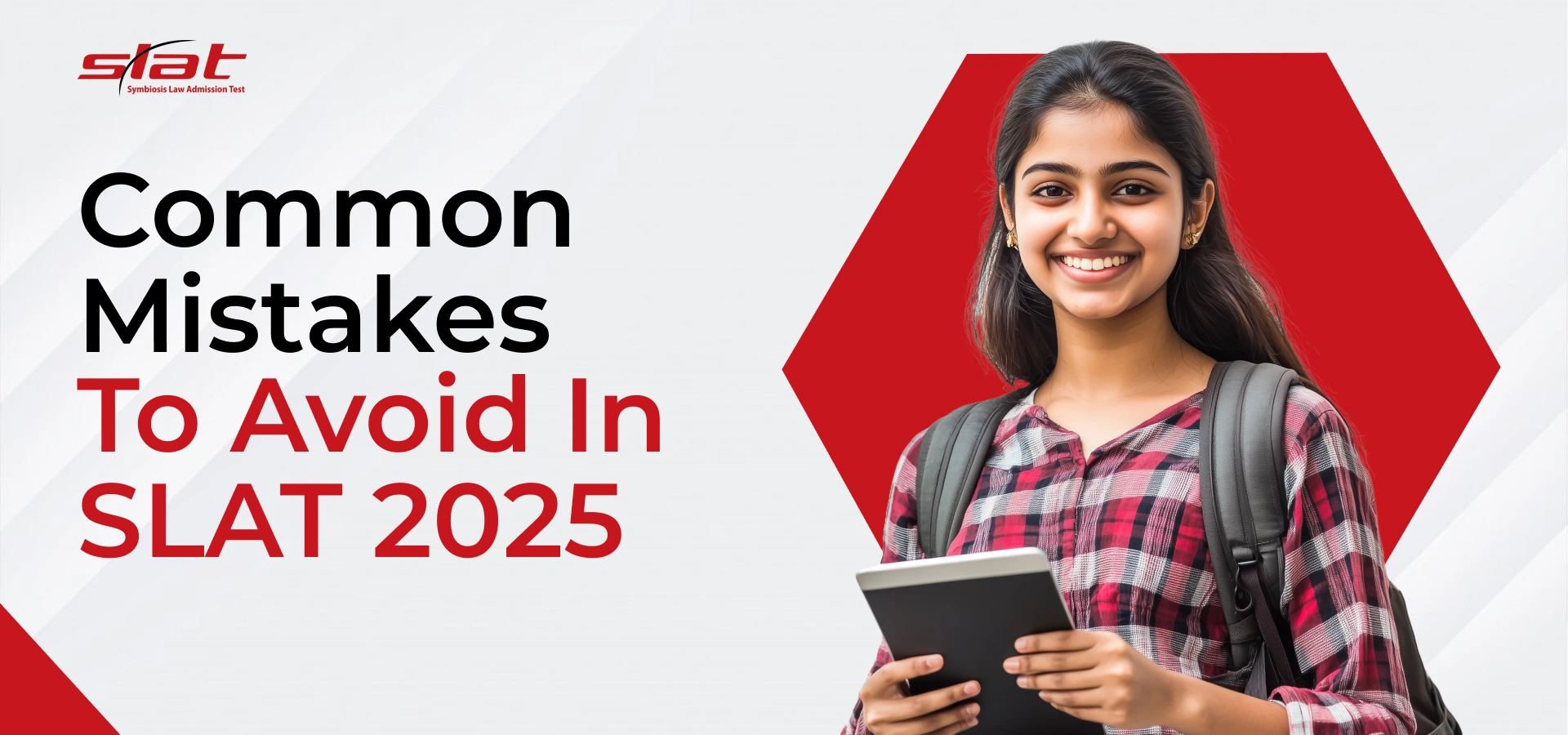Common Mistakes To Avoid In SLAT 2025

Overview
Although the Symbiosis Law Admission Test is your gateway to securing a place at the top law schools under SIU, many aspiring candidates unknowingly make some common mistakes that can derail their performance. For instance, lacking a structured study plan, skipping crucial SLAT-specific mock tests, or mismanaging exam time are key missteps that can cost valuable marks. Overlooking sections like reading comprehension and current affairs or placing too much emphasis on legal knowledge can throw your preparation off balance. So, to truly excel in SLAT 2025, students like you need to prioritise health, manage stress as well and avoid these pitfalls. By sharpening your strategy, you’ll not only feel confident but also maximise your chances of acing the exam. Therefore, this blog will provide you with detailed overviews regarding the same, so let’s dive in!
Understanding The Major Mistakes
1.Neglecting The Importance Of A Structured Study Plan
A well-structured study plan is crucial for SLAT 2025 Preparation Strategy. Without one, students often feel overwhelmed by the vast syllabus and fail to cover all sections effectively. A proper plan ensures you allocate sufficient time for each section, including Logical Reasoning, Legal Aptitude and English. Without organisation, you risk missing essential topics or cramming at the last minute, which reduces retention. To avoid this, create a daily and weekly timetable with clear goals, incorporating mock tests and regular revisions. Staying disciplined and consistent with this plan will give you an edge and keep your preparation on track.
2. Ignoring SLAT-Specific Mock Tests
General mock tests can be helpful, but ignoring SLAT-specific mock tests is a critical mistake. SLAT has its unique format and focuses on certain types of questions. Practice tests that simulate the actual SLAT pattern and questions will improve your familiarity with the exam. Mock tests help with time management, identifying weak areas and building confidence. Candidates who skip these often struggle with the real exam pressure. Aim to take multiple SLAT-specific mocks, analyse your performance and fine-tune your strategy to maximise your score.
3. Underestimating The Weightage Of Reading Comprehension
Many students underestimate the importance of reading comprehension in SLAT, thinking they can rely on their basic English skills. However, the comprehension section can be complex, requiring quick critical thinking and analysis. Candidates often struggle with time management due to lengthy passages, leading to rushed answers or incomplete sections. Regular practice in reading editorials, journals and complex articles helps sharpen comprehension skills. Neglecting this can hurt your overall score. Pay attention to accuracy and time spent per passage and focus on extracting key points to handle this section efficiently during the exam.
4. Overlooking The Current Affairs And General Knowledge Section
The Current Affairs and General Knowledge section is highly dynamic, yet many students overlook it until the last minute. It covers a wide range of topics, including politics, international relations, sports and science, which can only be mastered after some time. Skipping regular updates on recent events leads to a weak performance in this section. To avoid this, follow reliable news sources daily, create concise notes and review them periodically. Staying updated throughout the year ensures that you won’t struggle with this section, which can provide quick scoring opportunities if approached correctly.
5. Failing To Prioritise Time Management
One of the symbiosis law test candidate’s biggest challenges is managing time effectively during the exam. Each section requires focus, but spending too much time on one could leave other sections incomplete. Students often wonder how much time is required to prepare for SLAT? The answer depends on efficient time management during both preparation and the exam. Practising under timed conditions and knowing when to move on from a difficult question is crucial. Proper pacing ensures that you complete the exam, attempt all questions and maximise your score potential across all sections.
6. Neglecting Health And Stress Management
Because of rigorous preparation, candidates often overlook their health as well as mental well-being. Preparing for the Symbiosis Law Test includes not only academic focus but also maintaining physical and emotional balance. Neglecting sleep, diet, or relaxation can lead to burnout, affecting concentration and memory during the exam. Regular exercise, breaks and sufficient rest are key to staying sharp. Stress can impair decision-making and slow down problem-solving. A balanced routine, combined with stress-relief activities such as meditation, can enhance productivity. It can also keep you mentally prepared for the challenges of the SLAT exam day.
7. Not Reviewing Past Mistakes
Many aspirants take mock tests but fail to review their mistakes critically. Simply completing tests without analysis prevents you from learning where you went wrong. Reviewing past mistakes, especially from SLAT sample papers, is essential for growth. It helps identify patterns in errors, allowing you to focus on weak areas and improve. By understanding why a particular mistake occurred, you can avoid repeating it in the actual exam. Always set aside time after each mock test to thoroughly analyse errors and refine your strategy for better results in future tests.
Conclusion
In conclusion, avoiding common mistakes is crucial for success in SLAT 2025. A structured study plan, regular SLAT-specific mock tests, attention to time management and staying updated on current affairs are essential components of effective preparation. Additionally, managing health and stress, along with reviewing past mistakes, ensures a balanced approach to acing the exam. By understanding the SLAT Exam Pattern 2025 and applying these strategies, candidates can enhance their performance and tackle the challenges of the exam.

 9071013499
9071013499 info@slat-test.org
info@slat-test.org SLAT Bulletin 2025
SLAT Bulletin 2025







